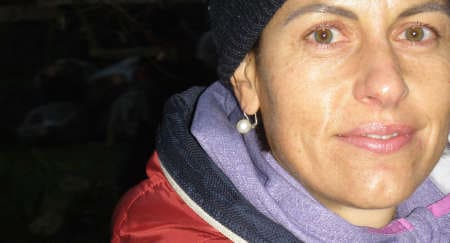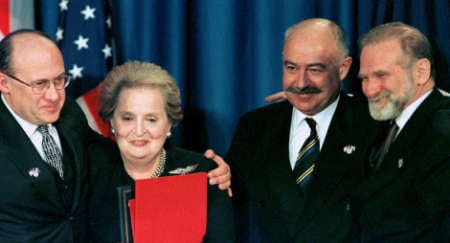
US Secretary of State Madeleine Albright with Foreign Ministers of the Czech Republic, Hungary and Poland at the signing ceremony, Independence, Missouri, 12 March 1999. © REUTERS
It was Friday 12 March 1999. It was a day like another for most people. But not for me and my colleagues at the Czech Mission to NATO. The day had come. The Czech Republic was about to officially become a member of NATO, together with Hungary and Poland.
The morning was busy, with lots of phone calls to Karel Kovanda, my boss at the time, who was also the first Czech Ambassador to NATO. I was his personal assistant, and like many other colleagues, had numerous and often incongruous duties. We were one team working for one goal.
I was so impatient to get through that morning to the afternoon, and see finally the event in Missouri: to hear Secretary Madeleine Albright say that we are in, we are part of NATO.
Then the hour arrived. Myself and some Czech colleagues gathered around a TV. We watched as events unfolded, on the other side of the world, in the US city of Independence, Missouri. Then came the moment when the Foreign Ministers of the three countries signed the accession protocols. We had become members of the North Atlantic Treaty Organisation.
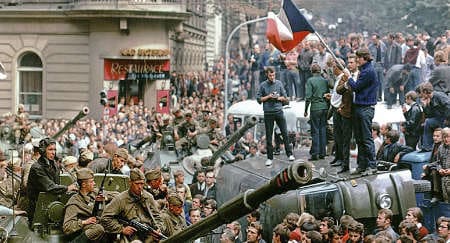
Soviet tanks in front of the Czechoslovak Radio station building in central Prague during the first day of Soviet-led invasion to Czechoslovakia, 21 August, 1968. © REUTERS
In her speech just after, US Secretary of State, Madeleine Albright said: “The promise of ‘nothing about you without you’ is now formalised; you are truly allies; you are truly home”. These few words ‘nothing about you without you’ mean a lot to many Czechs. We remember what happened in 1938, 1948 and 1968. Albright, who was born in Czechoslovakia, was someone who knew the weight of the words she pronounced to us that day.
This was something I could never have imagined back at school in communist times, when we learnt how NATO was our enemy, a danger to Czechoslovakia and the whole Soviet bloc.
I was very happy that these times changed, and that later I had a chance to be involved in the long path of becoming a member of the North Atlantic Treaty Organization.
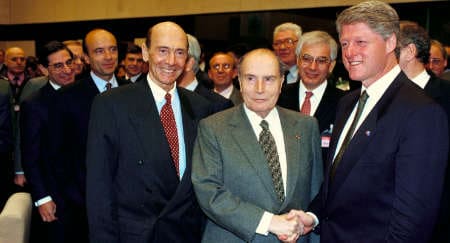
Partnership for Peace programme is launched by NATO’s Heads of State and Government, Brussels, 10 January 1994.
It had all started in 1994 with NATO’s Partnership for Peace programme. First, there were small and short consultations which then, over time, evolved into NATO’s invitation at its 1997 Madrid summit to the three countries to join the Alliance. Negotiations of military and membership requirements started between the three countries and NATO. The official accession date was then set for 1999 – coincidentally, the year of the Alliance’s 50th anniversary.
Many accession talks and rounds were held, and lots of work and late hours put into it on our side. I had already been working at the Czech Embassy since 1994, and lived all of this from the start. I was very young, but found it fascinating that I was actually living and helping creating a major change for my country.
I was just 25 when the big day - 12 March 1999 - arrived. That day, we reached our goal and could proudly say: ‘We made it, we are in NATO’. We had thrown off the long-lasting occupation by the Soviets prior to 1989. It felt fantastic. It meant that no such influence can ever happen again. And that we are safe.
Without going into too many details about NATO security passes, each headquarters pass has a different colour depending on whether you are from a NATO member country, or from a partner one.
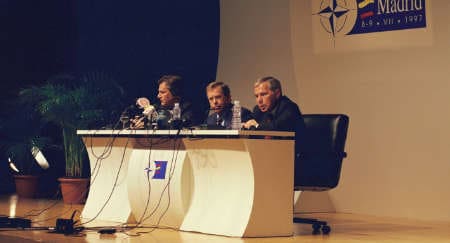
Press Conference held by the Heads of State and Government of the three countries of Central and Eastern Europe invited to open accession talks with NATO, Madrid, 8 July 1997.
Many of us from the new member countries went to the NATO Pass Office that afternoon on 12 March, and asked for a change of this badge. The main change was that the new pass was a different colour. From that moment everybody in-house could see – we are members now!
It almost sounds childish, but it meant so much for me.
Our celebrations continued with (several) glasses of champagne, and an evening party with all the colleagues.
The next morning was harder. NATO Ambassadors were leaving to Prague to participate in my country’s celebrations of our fresh membership, and I was helping organise their plane at the Melsbroek military airport in Brussels.
My boss, Ambassador Kovanda, could see I was a bit groggy that morning. And certainly knew why. But our celebrations had been great, much deserved, and I would do exactly the same today.
I will never forget these moments. I was part of history and helped – together with many others – to do something important and meaningful. Today, 15 years later, when I look at recent developments in Eastern Europe I feel an even greater meaning in our membership in NATO.

